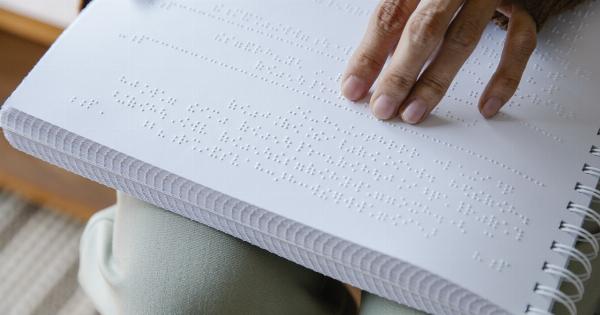When we think about maintaining our brain health, we often focus on activities like puzzles, brain exercises, and a balanced diet. However, many of us overlook the impact that hearing and vision loss can have on our cognitive function.
As we age, our sensory organs go through natural changes, and this can significantly affect the way our brain processes information, leading to various cognitive challenges. In this article, we will explore how hearing and vision loss can affect your brain health and provide insights into potential preventive measures.
The Link Between Hearing Loss and Brain Health
Hearing loss is a prevalent condition, particularly among older adults. It not only affects our ability to perceive sounds but can also have a profound impact on various cognitive functions.
Here are some ways in which hearing loss can affect brain health:.
1. Cognitive Load Increase
When we have difficulty hearing, our brain has to work harder to fill in the gaps in our auditory perception. This additional cognitive load can exhaust cognitive resources, leaving fewer capacities available for other mental tasks.
As a result, people with hearing loss may experience difficulties in memory recall, problem-solving, and attention.
2. Social Isolation and Cognitive Decline
Hearing loss can lead to social isolation and withdrawal from social activities. Engaging in conversations becomes challenging, and individuals may start avoiding social situations altogether.
Research suggests a strong connection between social isolation and cognitive decline. Lack of social stimulation can contribute to an increased risk of developing conditions like dementia and Alzheimer’s disease.
3. Increased Risk of Cognitive Disorders
Several studies have found a correlation between hearing loss and an increased risk of cognitive disorders.
Individuals with untreated hearing loss are more likely to experience accelerated cognitive decline and an elevated risk of conditions such as mild cognitive impairment (MCI) and dementia. The exact mechanisms behind this link are still being explored, but it is believed that the strain on the brain caused by hearing loss may play a role.
The Impact of Vision Loss on Brain Health
Vision loss, like hearing loss, can have a substantial impact on brain health and cognitive function. Here are some of the ways in which vision loss can affect the brain:.
1. Visual Processing Challenges
Our brain relies on visual input to process information about our environment. When vision is impaired, the brain struggles to interpret visual stimuli accurately.
This can lead to difficulties in object recognition, spatial awareness, and performing activities that require hand-eye coordination.
2. Increased Cognitive Load
Similar to hearing loss, vision loss can increase the cognitive load on the brain. The brain has to compensate for the lack of visual input by intensifying its efforts to gather information from other senses, such as touch and hearing.
This increased cognitive load can impede cognitive functioning in other domains.
3. Higher Risk of Cognitive Decline
Studies have shown a link between vision loss and a higher risk of cognitive decline.
Visual impairments, particularly age-related macular degeneration (AMD), have been associated with an increased likelihood of developing cognitive conditions like Alzheimer’s disease. The reasons behind this connection are multifaceted and encompass both physiological and social factors.
Protecting Brain Health Despite Sensory Impairments
While hearing and vision loss can significantly impact brain health, there are steps you can take to minimize their effects:.
1. Early Detection and Treatment
Regular hearing and vision screenings are crucial, especially as we age. Detecting sensory impairments early on allows for timely intervention and management.
Hearing aids, cochlear implants, glasses, and other assistive devices can help mitigate the impact of sensory loss on the brain.
2. Stay Socially Active
Engage in social activities and maintain social connections. Social interaction stimulates the brain and helps protect against cognitive decline.
If hearing loss makes socializing challenging, consider using assistive listening devices or exploring communication strategies with loved ones.
3. Mental Stimulation
Challenge your brain regularly with mentally stimulating activities. Read books, solve puzzles, play brain games, and learn new skills. Keeping your brain active can help offset the cognitive decline associated with sensory impairments.
4. Exercise and a Healthy Diet
Physical exercise and nutritious food are essential for overall brain health. Regular exercise improves blood circulation and promotes brain function.
A healthy diet rich in antioxidants, omega-3 fatty acids, and vitamins can also support brain health and potentially reduce the risk of cognitive decline.
Create a Brain-Healthy Environment
In addition to individual efforts, creating a brain-healthy environment can make a significant impact:.
1. Good Lighting
Ensure proper lighting in your living and working spaces, making it easier to see and minimize eye strain. Adequate lighting can compensate for vision impairments and reduce the cognitive load on your brain.
2. Clear Sound
Avoid excessive background noise and ensure clear sound transmission. Minimizing auditory distractions can reduce the cognitive load associated with hearing loss, enhancing communication and cognitive function.
3. Technology and Accessibility
Utilize assistive technology and accessibility features to support sensory impairments. There are various resources available, such as closed captions, screen readers, and hearing loop systems, that can enhance your daily functioning.
A Final Word
Preserving brain health goes beyond focusing solely on brain exercises and nutrition. Recognizing the impact of hearing and vision loss on cognitive function is crucial.
By taking proactive measures, staying socially engaged, and creating a brain-healthy environment, you can better protect your brain health and overall well-being.





























